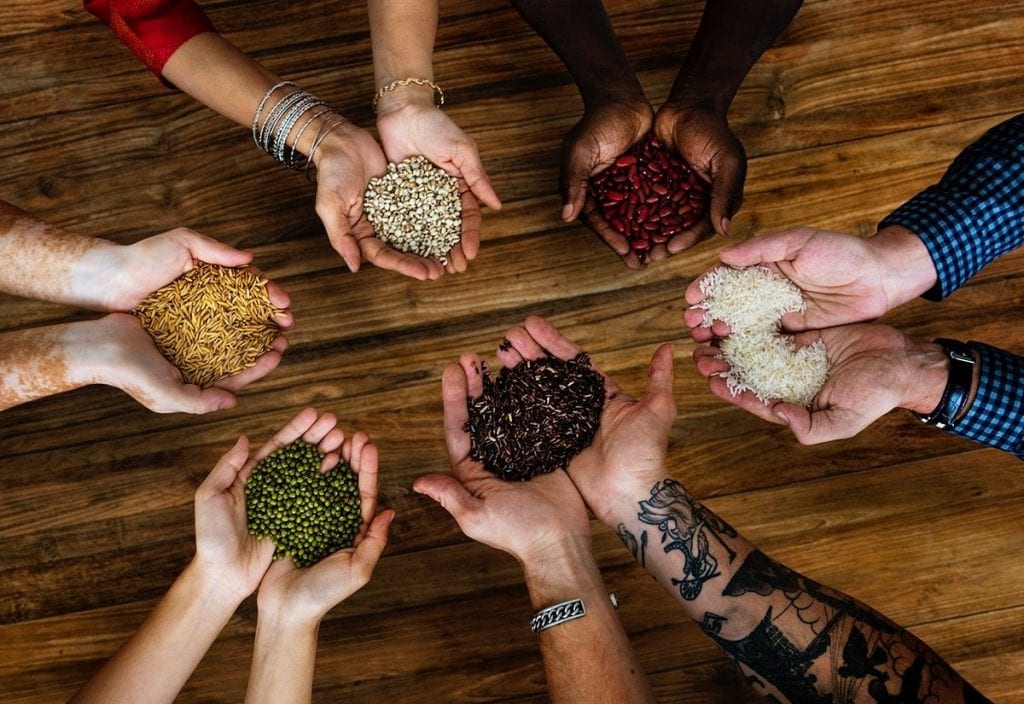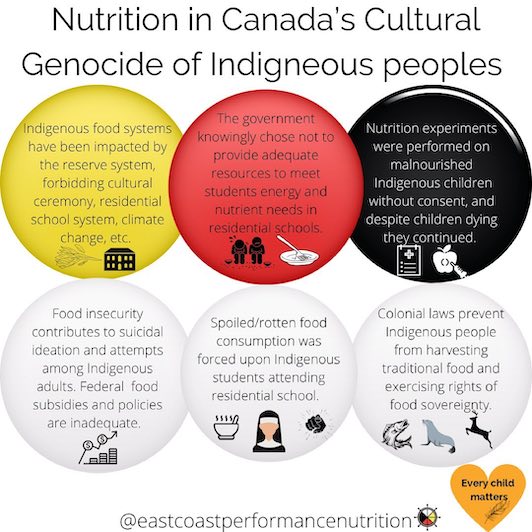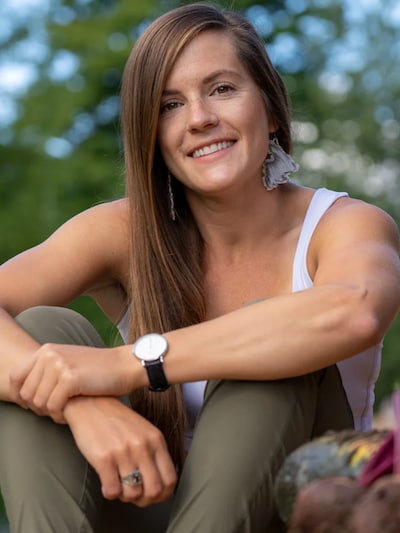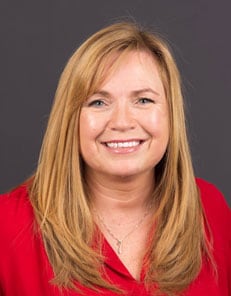Teaching about Indigenous Food Security: Q&A with Melissa Hardy and Dr. Lynne Lafave

In honour of National Indigenous History Month, we spoke with Melissa Hardy, a Mi’kmaw Dietitian, and Dr. Lynne Lafave, associate professor at Mount Royal University, on the importance of teaching about food insecurity in higher education and why they chose to write about Indigenous food security in the latest edition of Nutrition: A Functional Approach.
Tell me a little bit about why you chose to write about food security in Indigenous communities.
LL: Thinking about nutrition and assessing nutrient adequacy is based on the premise that everyone has access to and can make healthy food choices. We wanted to take a step back and contextualize the food landscape within Indigenous communities.
Food security is the first step in the process of making healthy food choices, then once food security is addressed, the opportunities and decisions of food choice can be explored.
Awareness of nutrition experiments conducted shortly after WWII perpetrated on malnourished Aboriginal communities have been brought to the forefront.
In line with the Truth and Reconciliation Commission #18, we have an obligation to partner with Indigenous communities to create nutrition education opportunities that meaningfully reflect First Nations, the Métis Nation, and Inuit groups.
Food security is a term that means different things to different people. What does it mean to you and why is it important?
MH: Food security to me means having access to enough food that is safe, culturally appropriate, and nutrient dense to meet the needs of individuals, families and communities across the lifespan.
It’s a complex topic that encompasses food systems and food sovereignty, which for Indigenous peoples are significantly impacted by colonization, as we wrote about in Chapter 13.5 of Nutrition: A Functional Approach.
Food security is important because nutrition is integral in all aspects of health, whether it be physical, mental, spiritual, or emotional. Nutrition plays a role in every major physiological system in the body and having the right balance of essential nutrients will help with optimal human functioning and overall wellness.
Being fed is essential, but consuming adequate nutrition that supports individual preferences, is optimal. We all deserve to feel our best and reach our potential. We cannot have this without food security.
Can you shed some light on the importance of education in addressing food insecurity?
LL: The Truth and Reconciliation Commission Call to Action #18 states that we must acknowledge the state of Indigenous health in Canada. Food security is a key factor in health and we need to know what is happening in all communities if we strive for change and improved health within Indigenous communities.
MH: In short, I would say, the importance of education in addressing food insecurity would be to ensure efforts to address food insecurity are culturally appropriate and allow for Indigenous self-governance.
It’s 2021, and thus way past time for the truth about Canadian history to be taught- at all levels. In university we are taught about high rates of illness and food insecurity in Indigenous populations, but never given the opportunity to learn why.
Many of the health problems faced by Indigenous people today are due to diet and are directly related to Canada’s cultural genocide of Indigenous peoples. The World Health Organization (WHO) recognized colonization as the most significant social determinant of health affecting Indigenous peoples worldwide.

Melissa Hardy shares the ways in which nutrition has played a significant role in the harming of Indigenous peoples.
Reconciliation starts with the truth, and nutrition is deeply rooted in Canada’s Cultural Genocide of Indigenous peoples. We need to re-write the texts and Chapter 13.5 of Nutrition: A Functional Approach is a step forward.
How does traditional Indigenous knowledge and practices help understand the concept of ‘nutrition’ and ‘health’ in new, empowering ways?
MH: This question would be better answered by an Indigenous knowledge keeper, rather than a Mi’kmaw Dietitian who still has a lot to learn when it comes to traditional Indigenous knowledge! But if I had to answer, I would say that health is multifactorial, and everyone has a right to define what health is to them. There is no one size fits all, and what works for someone else may not work for you.
Indigenous peoples are diverse, and thus we cannot generalize, but common themes I have heard and observed from Elders and knowledge keepers that resonate with me are:
- Respecting all living things and only take what is needed.
- Plants and animals are so much more than just food.
- Traditional foods are nutrient dense and also provide spiritual benefits.
Lastly, keep in mind that letters (credentials) behind your name doesn’t necessarily make you the expert. We need to make space for Indigenous knowledge in education.
What do you hope for students to get out of the in-depth chapter on Indigenous Food Security in Nutrition: A Functional Approach?
LL: First, I hope that students understand that food security is a right of all people. It is imperative that Indigenous self-governance in the achievement of that goal be a key component in the path to food security for Indigenous communities.
Second, I hope that students discover the high-quality research being conducted by Indigenous leaders about nutrition in their communities. In Nutrition: A Functional Approach, we have highlighted several nutrition surveillance programs, such as the First Nations Regional Health Survey (RHS) and the First Nations Food, Nutrition and Environment Study (FNFNES).

Melissa Hardy is a dietitian and proud Mi’kmaw from Ktqmukuk (Newfoundland) who left home in 2010 to pursue a Bachelor of Science in human nutrition and an integrated dietetic internship diploma at St. Francis Xavier University (StFX) in Antigonish, Nova Scotia.
Melissa has devoted her 6-year career to providing diverse nutrition education throughout rural communities. From fly-in Cree First Nations on the James and Hudson Bay Coast in Northern Ontario to Grey County in Southern Ontario, and now finally back on the East Coast residing in Antigonish, Nova Scotia. Melissa currently works part time at Sodexo as the campus food dietitian at StFX and has her own private practice, East Coast Performance Nutrition, where virtual technology allows Melissa to connect with people all over the East Coast.
Melissa holds board certified designations as a Certified Diabetes Educator (CDE), a Board Certified Specialist in Sports Dietetics (CSSD), and has also obtained a graduate diploma in sports nutrition through the International Olympic Committee. She is also a contributor of Pearson Canada’s Nutrition: A Functional Approach, 4ce.

Dr. Lynne Lafave earned a Ph.D. in nutritional sciences from the Department of Food and Human Nutritional Sciences at the University of Manitoba. She is an active member of the Dietitians of Canada and is a co-author of Pearson Canada’s Nutrition: A Functional Approach, 4ce.
Lynne’s primary research focuses on designing and assessing the impact of nutrition and physical activity interventions with a focus on early childhood education and care environments. Her research also includes investigating the role of food literacy in preschool-aged children’s dietary health within a community-based participatory research approach. She is currently a professor in the Department of Health and Physical Education at Mount Royal University in Calgary, Alberta where she teaches nutrition, statistics, and research methods courses.
Learn more about how you can teach Indigenous history and nutrition through Nutrition: A Functional Approach
A Pearson representative will follow up by email. You can withdraw your consent at any time. Please refer to our Privacy Policy or Contact Us for more details.